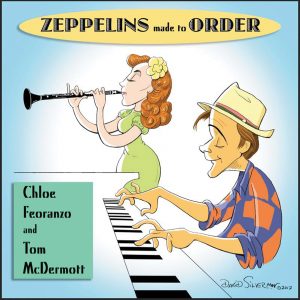 Tom McDermott is an uncharacteristic New Orleans pianist. The sheer virtuosity that epitomizes New Orleans “professors” from Jelly Roll Morton to James Booker is not his goal. McDermott thinks before he plays. His conception is steeped in compositional innovation and comparative structure. Where many New Orleans pianists play like a pure force of nature, McDermott’s playing is architectural. He is a keen student of history and a great listener.
Tom McDermott is an uncharacteristic New Orleans pianist. The sheer virtuosity that epitomizes New Orleans “professors” from Jelly Roll Morton to James Booker is not his goal. McDermott thinks before he plays. His conception is steeped in compositional innovation and comparative structure. Where many New Orleans pianists play like a pure force of nature, McDermott’s playing is architectural. He is a keen student of history and a great listener.
Over the years, after playing in a variety of contexts, McDermott has mastered the art of the duet. He has recorded a series of magnificent duet albums with Connie Jones, Evan Christopher, Kevin Clark, Meschiya Lake and Aurora Nealand. His Sunday afternoon duet series at Snug Harbor a few years back was legendary and he continues to play regular duet gigs at Buffa’s.
McDermott’s latest release is another series of duets, this time with reed player/vocalist Chloe Feoranzo, who has recently been performing with him at Buffa’s. Feoranzo, who moved to New Orleans last year, is a talented 24-year-old reed player and a stylish vocalist who is enamored of classic jazz. The California-bred musician gets a master class here from McDermott, who has her playing ragtime and early New Orleans jazz and singing a wide range of material—the Duke Ellington swing of “Everything But You” with a Betty Boop squeal at the end; Randy Newman’s poignant “Losing You”; the challenging harmonies of “Let the Rest of the World Go By”; and the album-opening “Mona Lisa,” which presents Chloe firmly in her comfort zone.
McDermott’s extraordinary ability to interact with his musical partners is best heard here on the elegant, classically sculpted “Musette for Nanette,” in which McDermott’s piano and Feoranzo’s clarinet engage in a breathtaking dance that evokes the image of a Technicolor waltz from the glory days of Hollywood.
As the album title suggests, McDermott is also something of a deadpan comic, and the playfulness of his music comes through on an expanded version of the wonderful “Satchmo Speaks” and the very unusual Christmas tune, “Santa’s Modulating to Town.” Feoranzo demonstrates her chops on the classically-inspired “Sweetly Awakened” and McDermott’s latest choro, “Curvilìneo,” with master percussionist Michael Skinkus pulsing it all along on pandeiro.
So yes, that track isn’t a duet; nor is the solo piano piece “Brazil, 1866.” That’s his pianistic musing in habanera form about what Brazilian music sounded like when Louis Moreau Gottschalk arrived in 1868. The title is another of McDermott’s jokes, referencing the Sérgio Mendes group of the 1960s, Brazil 66. The music, however, is no laughing matter, but inspiration of the highest order.




